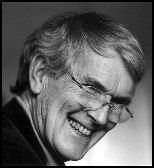The Paradox of Progress
 'James
Willis has written a book that is both delightful and important. It is, in
many respects, a serious book, but the touch is so light and so often
illuminated by wit, that reading it is a joy and the journey is fun.'
FROM PROFESSOR JAMES McCORMICK'S
FOREWORD
'James
Willis has written a book that is both delightful and important. It is, in
many respects, a serious book, but the touch is so light and so often
illuminated by wit, that reading it is a joy and the journey is fun.'
FROM PROFESSOR JAMES McCORMICK'S
FOREWORD
'Sensitive, humorous and eminently
readable, it offers the accumulated wisdom and vision of a deeply
concerned doctor'
BRITISH JOURNAL OF GENERAL PRACTICE
'The book can make you laugh
and cry, but brings you back to the real reasons why people stay working
in healthcare' HEALTH
SERVICE JOURNAL
'Beautifully written'
JOURNAL OF THE ASSOCIATION FOR
QUALITY IN HEALTHCARE
152 Pages....Paper........ISBN 1
85775 063 2
READERS COMMENTS
FULL TEXT
After three reprintings
over 15 years the rights of both of my books are now mine. I have copies,
price much reduced, and will print more as needed. Contact
JARWillis(AT)Gmail(DOT)com
 TOP
TOP
Friends in Low Places
 James
Willis' book says something so essential and vital that it needs to be
shouted from skyscrapers...
James
Willis' book says something so essential and vital that it needs to be
shouted from skyscrapers...
Gillie Bolton's review -
The Journal of Medical Humanities, June 2002
...It also, however, is about something as
simple as the emperor wearing no clothes. This is that a denial that
life-as-it-is-lived is wonderfully, hopeless-ly,
chaotic and complex - is not just doomed to failure, but will inevitably
cause untold damage. Our society is not only attempting to deny, but to
constrain life to become structured, controllable, controlled. There seems
to be an insane belief that life can be controlled by ticking boxes, by
diligently reading instructions, before doing anything, thinking anything,
being anything.
 Gillie Bolton's review continued
Gillie Bolton's review continued
214
Pages....Paper....ISBN 1 85775
404 2
 TOP
TOP
Some articles and lectures:
 Why
machines need people
RSM Video
Why
machines need people
RSM Video
John Fry is the pre-eminent
exemplar of the generation of free-thinking doctors who, acting entirely
on their own initiative, turned general practice in Britain, and
subsequently throughout much of the world, into a modern scientific
discipline. Now that the process of modernisation has run on for fifty
years, making general practice in Britain more machine-like than Fry could
possibly have imagined, it seems that the human qualities he exemplified
are no longer necessary and are in fact dangerous. Developing ideas which
James Willis originally derived from observations in his own general
practice, he will show that this is a tragic, potentially disastrous, but
not yet irremediable, mistake.
"
The 2010 John Fry Lecture at
the Royal Society of Medicine 14 July 2010
 NECTM
2006
NECTM
2006
"My passionate polemic,
given on what happened to be the day my youngest grandchild's was born,
urging an end to organised global warming denial.".
"
Opening keynote
for the North European Conference on Travel Medicine, Edinburgh
International Conference Centre,
6 June, 2006
 The
Human Side of Medicine
The
Human Side of Medicine
"So what I want to talk
about – is a kind of moving out from personal, seat-of-the-pants
practice based on independent professionalism, to a kind of fly-by-wire
practice in which, as in so many other aspects of modern life, our
dealings are with the front-end, the interface, of some intermediary
system rather than with the thing itself.
"
Talk to the South West
Trainers Group, Newquay, 26 November 2004
 The
Sea Monster and the Whirlpool
The
Sea Monster and the Whirlpool
"Not only must doctors
remain scientists in order to serve their patients, steering between the
Scylla and the Charybdis of my metaphor. I also believe they have a unique
contribution to make to science itself. General practice, through its
academic wing, through its Royal College, but especially through its
individual practitioners, doing the best and perhaps one of the most
important jobs in the world, can make a contribution to the next step
forward in our understanding. Provided they have confidence in the
validity of their view of life, and provided society gives them the
freedom and the respect they need to do their job."
Keynote
Address on 'Science' to Royal College
of General Practitioners'
50th Anniversary Symposium - Birmingham International Conference Centre
 Listen
to the Juggler
Listen
to the Juggler
"Balance. Tradition. I am
proud of our traditions in this country. And proud of our famous balance –
our gift for compromise. I do not wish to see all this thrown away in the
name of change. We must look back, and as we move forward into the
excitement of the new, we must keep our balance with the best of the old."
The 2001 George
Swift Lecture 16 Oct 2001
 The
Heart of the Matter
The
Heart of the Matter
"The next
stage of 'progress' may well involve our lightening-up and accepting that
life is not perfectible, that risk cannot be eliminated and that the role
of society is to celebrate diversity and to set the limits of acceptable
behaviour as widely as possible, never to direct the details of behaviour."
Address
given at the Royal College of Physicians on 29 Nov 2000.
 Maintenance'
Maintenance'
An appreciation of Pirsig's
famous book Zen and the Art of Motorcycle
Maintenance which was a major influence.
Published in
the December 2000 issue of Medical Humanities, in the series Medicine
through the Novel..
 Rules
can never describe life, they can only set limits
Rules
can never describe life, they can only set limits
Questioning proposals
for revalidation of the medical profession.
Article in the
British Journal of General Practice (Reference no 89 in Friends in
Low Places )
 TOP
TOP
Relevant
articles by others:
 Medical
Humanities: a vision and some cautionary notes. By Stephen Pattisson
Medical
Humanities: a vision and some cautionary notes. By Stephen Pattisson
An excellent analysis of the possible
"death course of a discipline",
reproduced (with permission) from the Medical Humanities Edition of the
Journal of Medical Ethics, June 2003
 After
Bristol: the humbling of the medical profession
After
Bristol: the humbling of the medical profession
An excellent analysis by Dr Michael Fitzpatrick
 Professor
David Morrell's Presidential Address to the British Medical Association
July 1994
Professor
David Morrell's Presidential Address to the British Medical Association
July 1994
ignored at the time, and never
published, but how right he was!
 Memoir
by a 'real person' if ever there was one, one of my patients:
Memoir
by a 'real person' if ever there was one, one of my patients:
 General
nurse training in the early '30s by Margaret Staples, SRN
General
nurse training in the early '30s by Margaret Staples, SRN
 TOP
TOP
My blog Generally Speaking
is at www.JARWillis.com
Email: JARWillis[AT]Gmail.com
Page
modified
15 December 2015


 James
Willis' book says something so essential and vital that it needs to be
shouted from skyscrapers
James
Willis' book says something so essential and vital that it needs to be
shouted from skyscrapers